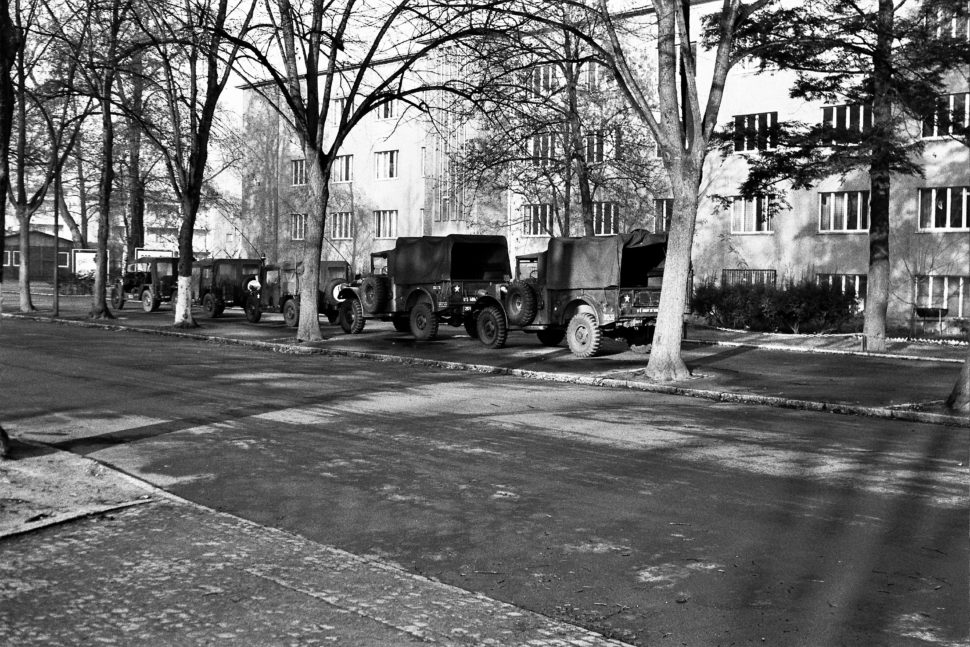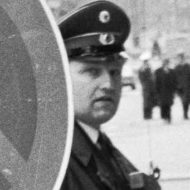by R. W. Rynerson
If members of the civilian public thought of the social life of GI’s in Germany, they were likely to remember hearing tales from early years of the post-war Occupation. Elvis Presley’s 1960 starring role in G. I. Blues might come to mind. By the end of the 1960’s the situation was different: the strong German economy put young Germans and Americans on an equal footing; the stresses and strains created by the war in Vietnam impacted contacts between GI’s and civilians.
In southwest Berlin, the diverse locations of American facilities overlapped the diverse locations of the Free University and other academic institutions. I arrived in Berlin in a time when close contact between the neighbors could be as friendly as ever, or could be uncomfortable, or even hazardous.
In 2024, I could still remember the students who were caught between the political demands of their community and simple neighborliness.
“Bring whatever kind of tea you like,” I had told the dining room server at the retirement home. It was “Mint Medley” and as the teabag sank in the hot water, the distinctive aroma swept over me. Memories caught me off guard.
In August 1969 I was an OJT Russian linguist, Spec 4, for the Rail Transportation Office. That was not what the mint brought to mind. Instead, I was remembering Wiebke, a Free University grad student, pouring mint tea into a couple of glasses. Wiebke, so earnest, was taking time from her high-level studies of English and Russian to share tea and linguistics with me.
We met in the cheap seats of the Berlin Philharmonic. I was pretty conspicuous in my dress greens. I did not have a suit yet (that is another story here, titled “Clothes Make the Man?”). As I looked down at the audience, I realized that I was the only man in uniform. Thirty years to the month, a Philharmonic audience would have included a lot of men in uniforms, diplomats with their sashes, etc. They would have been preoccupied with planning World War II. I was preoccupied with meeting some Germans my age.
After the concert, we found ourselves both headed to the Route 48 buses. A transit supervisor was loading the yellow parade of double-deckers for the Philharmonic crowd and somehow we were swept along within sight of each other. My saucer cap brushed against the ceiling in the lower deck. I could tell that she was puzzled by an American enlisted man who did not fit her Hamburg-preconceived image of a G.I., but she took a chance on letting me walk her home to the grad student housing.
That led to afternoon breaks in her studies, always including those glasses of mint tea. We helped each other with English, Russian, and German. She introduced me to other selected grad students.
Why “selected?” We were at the dawn of a violent student movement that was to trouble Germany for years. The library had been burned. The German Studies Department was already blocked by demonstrators. The so-called Red Army Faction was taking shape in Dahlem, soon to attack the police and then the U.S. Army. Wiebke asked me to keep my visits low key. She chose guests whom she trusted. One night I found myself talking with a fellow student who explained how the upper house of the Federal Parliament functioned – in detail. It was 0300 Central European Time when I walked home to Andrews Barracks. An acquaintance on guard duty winked at me. Another wild night in Berlin!
I went on to a job with G-2 Division, and now that endangered both of us, so we went our separate ways. Years later I heard that she was a public relations officer for an international drug manufacturer in her native Hamburg. I will always be grateful for some advice she gave me: “You do not need to read Goethe and Schiller to understand German.” Gott sei dank!

This page is excerpted from an article published in the Berlin Observer Issue 103.
